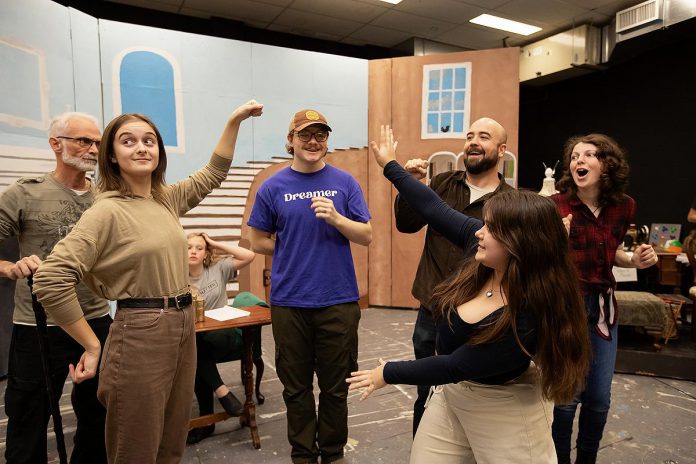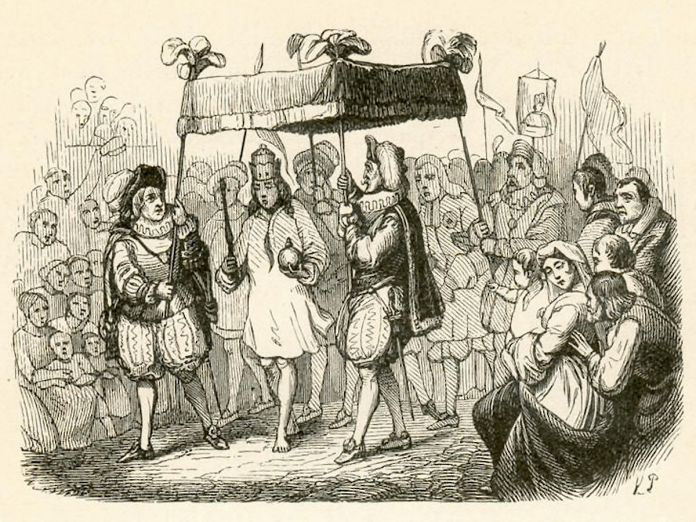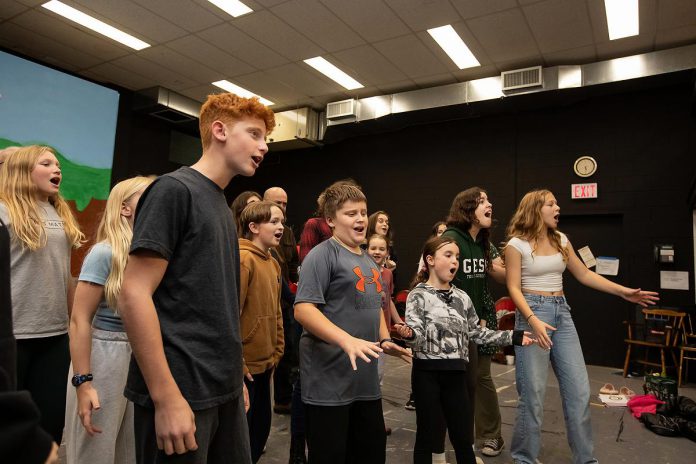
The emperor’s clothes may be new, but Gerry McBride’s connection to one of Hans Christian Andersen’s most popular folktales is anything but new.
More than five years after McBride wrote a reimagined version of “The Emperor’s New Clothes,” his script is now getting its due as part of the Peterborough Theatre Guild’s 2025-26 season.
Opening on Friday, December 5 at The Guild Hall on Rogers Street in Peterborough’s East City and offering both evening and matinee performances, The Emperor’s New Clothes promises “laughter, music, and mischief” for the entire family.
The Danish author’s folktale was first published in 1837, along with “The Little Mermaid,” in the third and final instalment of Fairy Tales Told for Children, a compilation of nine fairy tales.
At the heart of the story is an emperor who, consumed by his love of extravagant clothing, spends lavishly on new outfits at the expense of everything else. When two con men posing as weavers promise him magnificent garments woven from a magic fabric invisible to anyone incompetent or foolish, the emperor eagerly hires them, believing the clothes will help him expose unworthy subjects.
The swindlers set up their looms and pretend to work, and when the emperor’s trusted officials are sent to inspect the progress, they see nothing but still praise the invisible clothing to avoid appearing unfit for their positions. The emperor later visits the looms himself, and though he too sees nothing, he pretends otherwise for fear of being judged unfit for his throne.
Once the so-called weavers announce the clothes are finished, they mime dressing the emperor in his non-existent finery before he sets off, completely naked, for a procession through the town. Eager not to appear foolish, the townspeople marvel at his “magnificent” outfit as he parades by, each pretending to see what isn’t there. The illusion collapses only when a child blurts out the obvious truth — that the emperor is wearing nothing at all — a revelation soon echoed by the crowd. Although the emperor suspects they are right, he chooses to continue the procession rather than admit his embarrassment.

McBride’s adaptation, which, when a teacher, he first wrote at the start of the pandemic lockdown as a means to keep his forced-out-of-class students engaged, remains true to the original story’s premise — but not entirely.
“There are tropes in it,” says McBride, who is also directing his adaptation. “There’s the vain emperor. There are the two scoundrels. There’s the emperor’s entourage who they’re trying to fool. There’s kind of iconic characters. I kept true to the story, but I did add a character that I call Mouse, a servant in the court. She’s very quiet and keeps in the background. She’s the only one who figures out what’s going on, but nobody listens to her.”
McBride says writing an adaptation of a popular story proved “a lot easier” than penning an original story.
“You know the story … you just have to fill in the parts,” he says. “I find when I’m writing an original story, I often know the beginning and the end, but I don’t know the middle. I wrote the first draft (of this adaptation) inside of three weeks.”
McBride’s version features music very much at its centre. Enter music director John Austin, whom McBride worked alongside as part of the cast for Electric City Players production of Twelfth Night staged earlier this year.
“I didn’t know him well, but at the cast party afterwards, I asked ‘Do you think you’d enjoy writing kids’ songs for a play?” recounts McBride.
Austin picks up the story from there.
“When they (the Peterborough Theatre Guild) said ‘Yes, we want you to do the show,’ only two songs had been written to completion,” he says, noting the production now features five original songs, two reprises of those songs, and three instrumental pieces. “We had enough to demo for them — two songs to kind of sell it — and then when they said ‘You’re doing the show,’ I was like ‘OK, let’s get cracking.'”
“We played with the idea of having a live performance — a live band — but for a variety of reasons, one being that the set was built and there was no place to put a band, the group that I had invited to play live recorded the music.”

Early rehearsals, adds Austin, have left him near speechless.
“I’m going to be riding this high for years,” he says. “I couldn’t believe how excited I was to hear these actors, not just performing the songs I wrote but (doing so) enthusiastically. You want to talk about gratifying. Nothing has matched that in my life.”
“We have been blessed with a really talented cast of enthusiastic young people and enthusiastic (stage) veterans who have brought a real ability to interpret what would be funny in the script and bring it out. They make it feel organic every time.”
While McBride took some liberties with the original story, its themes remain intact.
“It’s very much a cautionary tale of what happens when you have too much vanity,” he says. “The idea of the con artist conning somebody who deserves to be conned has always been sort of a favourite thing of mine. It’s sort of like justice.”
“The vanity theme is the main one. Also, there’s the idea that con artists can have a nice side to them. The whole thing with the Mouse character is she’s very humble, very quiet, but she’s also the smartest one there. They (the con men) know that she knows what’s going on, but they also know that nobody is going to listen to her. She finally musters up the courage to tell them what she thinks, but nobody listens to her. She says ‘The heck with them’ and she’s quite happy they get away. She washes her hands of the whole thing.”
McBride points to his new character representing another theme in the play — “The very meek and mild among us can be the smartest.”

While both McBride and Austin are, unsurprisingly, hopeful that The Emperor’s New Clothes entertains, they do share another aspiration.
“We’re doing five school performances,” notes McBride. “I hope kids leave this thinking ‘I want to go to another one (play)’ or ‘I want to get involved in live theatre.’ That they see it and that makes them want to see more.”
“I want them (audiences) to see how much fun we are having, that we genuinely love what we’re doing,” adds Austin.
“We’re not just churning out content. We put thought and love into what we’re doing. We want people to see the value in that. Even if you’re like ‘That wasn’t to my taste’ or ‘I don’t particularly like children’s shows,’ you can see that we cared enough about this to do a really good job of it.”
The Emperor’s New Clothes stars Jack van Roosmalen as the Emperor, supported by leading cast members Tom Stanley, Karen Woolley, Aaron Black, Laura Yandt, David MacKinnon, Alice Loeb, Linnaea Couling-Fligg, and Mark Carravaggio.
Along with producer Marion Griffin, offstage support is provided by assistant producer Lyn Braun, choreographer Julie Fallis, stage manager and set designer Hayley Griffin Montgomery, and assistant stage manager Tami Whitley. Abbey Duncan is sound designer, Andy Duncan is lighting designer, Gwen Hope is costume designer, and Shelley Moody is hair and makeup designer.
The production runs for seven public performances, with evening performances at 7:30 p.m. on December 5, 10, and 12, and matinee performances at 1:30 p.m. on the weekends of December 6 and 7 and 13 and 14. Tickets cost $15 and are available by phone at 705-745-4211 or online at www.peterboroughtheatreguild.com.
kawarthaNOW is proud to be a media sponsor of the Peterborough Theatre Guild’s 2025-26 season.


























